#phildickian
Text
This day in history
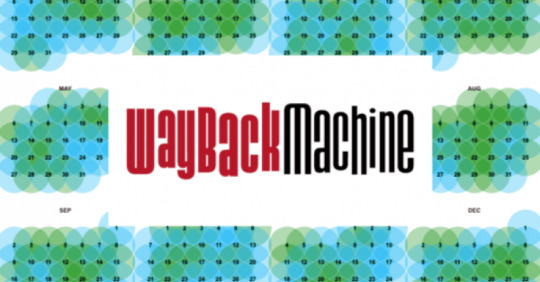
#10yrsago FBI responds to ACLU FOIA request…with 111 blank pages https://arstechnica.com/tech-policy/2013/01/fbi-to-aclu-nope-we-wont-tell-you-how-when-or-why-we-track-you/
#10yrsago Michelle Bachmann stiffs her campaign staff, they retaliate by ratting to the feds https://www.startribune.com/ex-bachmann-aide-alleges-campaign-finance-violations/187048461/
#5yrsago Neither Huxleyed, nor Orwelled: living in the Phildickian dystopia https://www.bostonreview.net/articles/henry-farrell-philip-k-dick-and-fake-humans/
#5yrsago A newly discovered strain of Android malware contains never-seen surveillance features https://securelist.com/skygofree-following-in-the-footsteps-of-hackingteam/83603/
3 notes
·
View notes
Text
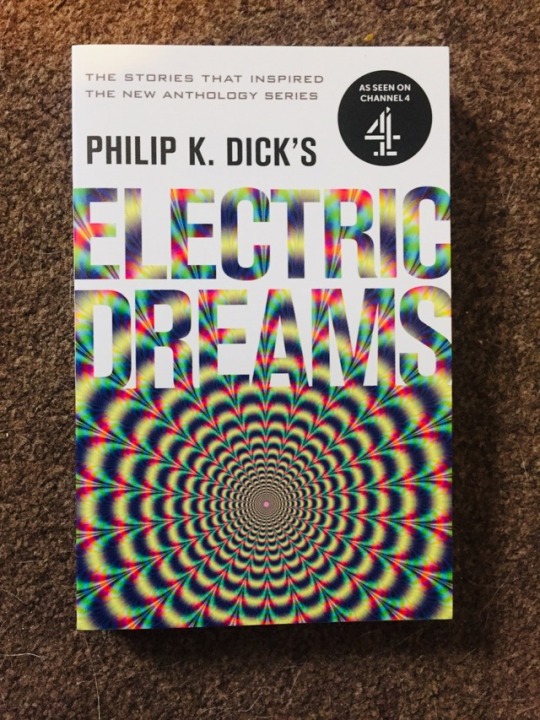
I swear he knew what was coming
#philip k dick#philip k dick electric dreams#electric dreams#sci fi#philip k dick book#sci fi author#short stories#science fiction#science fiction author#pkd#p k d#phildickian
2 notes
·
View notes
Text
Not to sound like a liberal comparing the horrors of real life to fictional media I consume, but this whole situation with Trump and antifa has me reminded of a PKD novel I read last year.
The book Radio Free Albemuth takes place in a fictionalized 1970s California during the presidency of a fascist politician, a character directly inspired by Nixon. The president is named Francis Fremont, and to bolster his position of control in government, he invents an internal foe to rail against: the communist conspiracy of Aramchek. The only thing is, Aramchek doesn't really exist.
(Or maybe it does, as the story progresses in classic Phil Dick fashion)
Surely you can see the parallels. Antifa is not any sort of national organization or grand conspiracy. What antifa is, is pockets of affiliated individuals who are taking a stand against fascism. But Trump spins it as an existential threat to law and liberty, an international conspiracy where anyone suspect of anything could be "antifa".
It's completely paranoid, conspiratorial thinking, and it's kind of insane to watch this play out in real life.
Trump is a bullshitter, a true Phildickian president. Every word out of his mouth is what Phil would call shuckin' and jivin'.
11 notes
·
View notes
Text
Neg Sparkle #2


LOOK AT THOSE CAVEMEN GO
As a part-time ignoramus, I was introduced to the parable of Plato's cave by Bernardo Bertolucci's film The Conformist, in which a professor and his former student take turns telling the story while cinematographer Vittorio Storaro makes the imagery perceptible via a blast of smoke-infused lighting slanting under a lowered blind. The shadows of the two speakers are cast on the wall, making them simultaneously narrators of a tale and stand-ins for the characters in it.
Plato's cave is a tale of Phildickian false reality and its potential exposure: prisoners in chains watch shadows cast on the cave wall and, with no experience of real life, they mistake these two-dimensional abstractions for real objects. My cat Momo, who is an idiot, similarly gets confused between pigeons on a wall and the shadows of those same pigeons on another wall, which casts doubt on Plato's claim that breaking our chains and looking at life as it is would allow us to recognize flat shadows as the illusions they are.
Which brings us back to the cinema. Originally, movies were literally shadows, created by passing light through a moving film-strip patterned with various degrees of opacity. Now the same effect is achieved by digital means and comes to us on screens large, medium and small, but it's the same effect, Quentin Tarantino, so let's not get precious about it.
It is apparent that we are to some extent aware that the shadow-images around us aren't real: they may be records of real things and occurrences, or purely digital animations, special effects, abstractions or deepfakes, but they are at the very least differently real from the things we see that aren't framed by screens. We know they're merely recordings, unlike Momo who stares at bird footage on YouTube and reaches idiotically for the screen with outstretched claws as if to pluck a paw full of feathery goodness from the liquid crystal display.
We know these things aren't real. But do we? Maybe we know they're not really real, but still consider them a bit real? Real enough for us to be a bit concerned for the plight of a fictional character, in a way that has more to it than merely anxiety lest a story end in an unsatisfying way. Of course, we can get interested in the problems of wholly abstract characters in books, too, characters who have no real physical form or even the illusion of one, save those attributes we assign them in response to the author's suggestions.
What I'm trying to say,I guess, is that, in terms of telling shadow from reality, we're kind of screwed.
by David Cairns
1 note
·
View note
Text
Four Kinds of Dystopia | Darren Allen
The twentieth century saw four basic visions of hell on earth, or dystopia. These were:
(via Four Kinds of Dystopia | Darren Allen)
The reader can decide for herself under which of above we currently struggle to eke out a life worth living. I would like to suggest that all modern societies are both Kafkaesque and Phildickian with either a Huxleyan or Orwellian overarching framework; modern, western, capitalist societies tend to be basically Huxleyan (HKP) and pre-modern, eastern, communist countries tend to be basically Orwellian (OKP).
The reason why ideological managers** (academics, film directors, journalists, etc) prefer to have two (or more) dystopian systems is that it makes us seem like the goodies and them the baddies. Communism is to blame for their foodbanks and breadlines, but capitalism has nothing to do with ours (or vice versa). Sure our masses have the same miserable lives as theirs, reel under the same bureaucratic insanity, stumble around the same shoddy unreal worlds, and witness the same catastrophic destruction of nature and beauty as theirs do, but at least we’ve got democracy! / at least our families stick together! / at least the trains run on time! / at least GTA 9 is coming out soon / at least the Olympics will cheer us up (delete as appropriate).
1 note
·
View note
Text
Understanding Qanon

Both left and right politics have seen surges of conspiratorial thinking, but without question the most organized and politically salient conspiracy theory at the moment is Qanon. In The Atlantic, Adrienne LaFrance dives deep into Q and its context.
https://www.theatlantic.com/magazine/archive/2020/06/qanon-nothing-can-stop-what-is-coming/610567/
As comprehensive as LaFrance's account is, there's one blank spot: why is belief in conspiracies is surging in the first place?
The main explanation - a subtext running through LaFrance's excellent piece - is that algorithmic persuasion is to blame.
That is, the systems that Big Tech built to convince us to buy refrigerators and acne cream are now being hijacked to convince us that pizza parlors are harboring pedophile rings in their (non-existent) basements. I am very skeptical of this account.
First, because the best evidence we have for Big Tech's power to perform these persuasive miracles comes from Big Tech's own marketing puffery, what they tell potential advertisers to justify their rate-cards, and what they tell investors to buoy their share prices.
Neither the source nor the claim is particularly credible. If there's one thing we know, it's hard to convince people of stuff. That, in fact, is the hard problem of advertising, religion, politics, art, and social change. No one has systematized it in an enduring way.
What Big Tech does VERY well, however, is find people. It can find people who are thinking of buying a fridge (a diffuse, hard-to-locate cohort) by targeting people who've shopped for fridges or kitchens, or perused reviews. This isn't a persuasive miracle, it's just spying.
Likewise, Big Tech can help people with fringe ideas locate each other. This is true irrespective of how much you like those fringe ideas: it doesn't matter if the idea is #BlackLivesMatter and gender is a spectrum or white nationalism and the Earth is flat.
I believe what we call "persuasion" is primarily "targeting." If the major barrier to the spread of your message is that you can't find the people who would be receptive to it, Big Tech's people-finding systems can supercharge your ideas.
This works especially well for ideas that invite social disapprobation if you publicly embrace them - which is why the internet is such a godsend for queer kids who fear discussing their sexuality with intolerant friends or parents.
It also works great for conspiracies.
Which raises a different question: why is it so easy to find people who want to believe in conspiracies. My answer: because so many of the things that have traumatized so many people ARE conspiracies.
The opioid epidemic was a conspiracy between rich families like the Sacklers and regulators who rotate in and out of industry. The 737 crisis was caused by Boeing's conspiracy to cut corners and aviation regulators' conspiracy to allow aerospace to regulate itself.
Senators conspire to liquidate their positions ahead of coronavirus lockdown, well-heeled multinationals conspire to get 94.5% of the "small business" PPP fund, Big Tech conspires to fix wages with illegal collusion while fast food franchises do the same with noncompetes.
In a world of constant real conspiracy scandals that destroy lives and the planet, conspiracy theories take on real explanatory power. This is beautifully discussed in Anna Merlan's 2019 book, "Republic of Lies."
https://boingboing.net/2019/09/21/from-opioids-to-antivax.html
All of this is the context for Qanon. Add to that the fact that Q is also a literal industry whose superstars make fortunes - and not necessarily cynically, because, after all, what better proof could you ask for of the truth of Q than the fact that it's making you rich?
Another consequence of making it easier to find people is that groups can coalesce around loosely defined principles. Pre-internet, the high cost of group-forming meant that you would be wasting a lot of effort by grouping with people who disagreed with you on fundamentals.
Eventually, those disagreements would drive you apart and all your group-forming work would be wasted. But lower-cost group forming makes it easier to take risks on making common cause with people you disagree with.
People who criticized Occupy for the lack of a crisply defined program missed this point: by refusing to narrowly define its cause, Occupy could be a broad tent.
Q's gnomic utterances are perfectly suited to exploit this increased appetite for risk in group forming.
Q's nonsensical utterances become an oracle that different kinds of conspirators can project their own fears and aspirations onto, creating multiple, irreconcilable interpretations for these pronunciations.
And that very vagueness and imprecision allows Q followers to find post-facto interpretations that show that Q was right all along (a favorite pastime of mystics from Revelations to Nostradamus).
Q is both a rehash of historical conspiracy pathologies and utterly of this moment, then. It's a phildickian phenomenon, a conspiracy whose gospel reads like the cryptic notes I get from stalkers who are having terrible, paranoid hallucinations.
Q is both a rehash of historical conspiracy pathologies and utterly of this moment, then. It's a phildickian phenomenon, a conspiracy whose gospel reads like the cryptic notes I get from stalkers who are having terrible, paranoid hallucinations.
One of the milestones in my understanding of conspiracists was this outstanding interview with a leading Flat Earther by the Oh No Ross and Carrie podcast:
http://ohnopodcast.com/investigations/2018/7/20/ross-and-carrie-traverse-flat-earth-part-7-the-jeran-campanella-interview
He describes his satisfaction with Flat Earth as compared with other conspiracies.
By which he means that the community bonds and his ability to have high stature in it are satisfying and that makes it feel true.
These feelings, along with the trauma of real conspiracies, make conspiracism a powerful temptation. That should guide our thinking on Q.
Not the junk science of the nonreplicating, discredited "backfire effect" (which is a polestar for Facebook's approach to conspiracy despite its lack of rigor):
https://pluralistic.net/2020/05/14/everybody-poops/#backfire-effect
Meanwhile, if you want to get deeper into the bizarre mythology of Q, I highly recommend this "Qanon exit briefing."
https://violentmetaphors.com/2018/12/04/your-q-anon-exit-briefing/
269 notes
·
View notes
Quote
We are having a problem with Mr. Computer again. It has totally spaced out. An
hour ago it routed all the whipples in New York across the same intersection.
Loss of life was heavy. And instead of responding to the disaster with fire and
police rescue teams it dispatched a circus troop of clowns.
*[Mr.]: Mister
Dick, Philip K., “The Day Mr. Computer Fell Out of Its Tree” in Dick, Philip K., We Can Remember It for You Wholesale: Volume Five of the Collected Stories (London: Millennium, 2000), p. 309.
3 notes
·
View notes
Text
#9yrsago Empire State: a phildickian noir detective/superhero/pocket universe novel
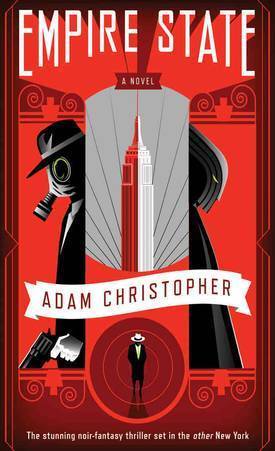
Adam Christopher's debut novel Empire State is a noir, Philip K Dick-ish science fiction superhero story about a pocket universe that's created when two battling New York superheroes open a vent through spacetime. New York City is reflected through this vent into the pocket, and in the distorted surface of the pinched-off bubble of reality, the city is reflected back in strange, existential form. The new city is called Empire State, and it is a grey, washed-out version of New York, perpetually shrouded in mist, perpetually at war, and the brave lads of Empire State are forever being wired into the bodies of robots and sent off in seagoing Ironclads, warships that never return.
New York and Empire State are imperfect mirrors of one another, and only a handful of people in either city know or suspect of the existence of the other. Some people are mirrored in the new world, versions of themselves that are either convincingly like the original, or their polar opposite, or something in between. The year is 19, nineteen years after the creation of Empire State, and the war slogs on, and the strange, violent bureaucracy that runs the city and persecutes the war tightens up the rationing and prohibition that make life even darker in Empire State.
This is a novel of surreal resonances, things that are like other things, plot turns that hearken to other plot turns. It's often fascinating, as captivating as a kaleidoscope, especially if you don't spend too much time trying to figure out the mechanics of the setup, the physics of the worlds. Just let it wash over you, the way that Jonathan Lethem's phildickian debut Gun, With Occasional Music does, and don't think too hard -- just feel it in all its weird glory.
This is a promising debut, and the publisher, Angry Robot, is pursuing a great promotion: WorldBuilder, "our way of reaching out to the fan creator communities, to invite you to come play in our yard." It's an official, sanctioned place where fans and pros can work together to create new media inspired by Empire State and its superheroes, hard-boiled dicks, traitors, madmen, cult leaders, and endless war.
Empire State
https://boingboing.net/2011/12/27/empire-state-a-phildickian-noi.html
4 notes
·
View notes
Text
#3yrsago Medusa's Web: Tim Powers is the Philip K Dick of our age

Tim Powers is a fantasy writer who spins out tales of wild, mystic conspiracy that are so believable and weird, we're lucky he didn't follow L Ron Hubbard's example and found a religion, or we'd all be worshipping in his cult. Along with James Blaylock and KW Jeter, Powers was one of three young, crazy genre writers who served as Philip K Dick's proteges, and Powers gives us a glimpse of where Dick may have ended up if he'd managed to beat his own worst self-destructive impulses.
Powers' latest (and, to my mind, best) novel is Medusa's Web, a meticulously researched novel about an extended, dysfunctional family whose secret history is bound up with "spiders" -- eight-legged drawings that allow you to travel out of your body and into other places and times, when other spiders were taken.
The spiders have been with us for centuries; Medusa's eight-snaked head was a spider, and the reality is that looking into her eyes didn't turn men to stone, it merely transfixed them as they imbibed the experiences of thousands of other people, including, possibly, people from other planes of experience. The spiders are alive, two-dimensional beings for whom all times are the same time, and when you notice them, they notice you and take you into their world, where all objects appear infinitely tall, where depth vanishes. Taking spiders means letting strangers through all history enter your body, or sometimes, future versions of yourself, and their use of your limbs and mouth can leave you injured, or even dead.
But the spider-users crave them, because there's that moment, that moment of dislocation when you're in no body and every body, when your self is blissfully obliterated. This is a story about drugs and addiction, in the phildickian style, but Powers far surpasses Dick.
Powers's story is set in Los Angeles, in the huge, decrepit mansion of the old lady who served as matriarch to the family -- a house that recalls the House of Usher in more ways than one -- a mansion that has played a key role in the history of spiders and Hollywood, involving a cast of characters that includes Rudy Valentino and many of silent film's most debauched leading lights. The Powers method for constructing secret histories is to line up seemingly unrelated historical events that share a place or time and then invent a connection to explain the coincidence, and it works brilliantly here, as the very geography of LA and the history of film are recruited to give a plausible footing to the story Powers tells.
The themes of Medusa's Web have been part of the Powers canon since the start; possession was a major theme of Dinner at Deviant's Palace, and it returns in his World Fantasy Award-winning masterpiece Last Call. The ancient conspiracies stretching back into Greco-Roman mythology will be familiar to those who enjoyed Hide Me Among the Graves as much as I did.
But Powers isn't rehashing his favorite themes, he's honing, making them sharp enough to slice away our reality in that Philip K Dick way. But Dick was a self-destructive drug addict whose speed ran ahead of his prose, producing brilliant but uneven books with stilted dialog and weird protrusions in the plot that remind you that you're reading a story, not a history. Powers went from being "a big fan of alcohol" to a teetotaler more than 20 years ago, and he's got both the intimate knowledge of being out-of-control and the sobriety to be in control when he writes about it. If Dick had gone sober and practiced his craft for 20 years longer, he could have written a book like this.
Reading any Powers novel is a visit to an alternate reality where everything, even the stones, are conspiring with one another. Medusa's Web is a gorgon of a novel, constructing that sinister, paranoid reality so perfectly that it transfixes anyone who dares crack its cover.
Medusa's Web [Tim Powers/William Morrow]
https://boingboing.net/2016/03/18/medusas-web-tim-powers-is-t.html
9 notes
·
View notes
Text
#1yrago Neither Huxleyed, nor Orwelled: living in the Phildickian dystopia

Political scientist and sf fan Henry Farrell (previously) argues persuasively that the dystopian elements of our everyday life are best viewed through the lens of Philip K Dick (whose books repeatedly depicted a world of constructed realities, whose true nature was obscured by totalitarians, conspiracies, and broken computers) and not Orwell or Huxley, whose computers and systems worked altogether too well to be good parallels for today's janky dystopia.
In the PKDverse, it's increasingly hard to tell bots from humans (and even the bots might struggle to tell whether they are or are not artificial), and "centaurs" (human-machine collaborations) poison our mediasphere with software agents that periodically get puppeted by real-life trolls. These centaurs use captured bits of human intelligence -- Wikipedia scrapes, messages harvested from social media -- to impersonate humans when no human is available to puppet them, but then summon human assistance when they reach a crux that's above their paygrade -- a moment of truth when it is possible to effect an epic troll, or complete the next phase of a giant con.
https://boingboing.net/2018/01/17/ubiks-centaurs.html
39 notes
·
View notes
Text
#8yrsago Empire State: a phildickian noir detective/superhero/pocket universe novel
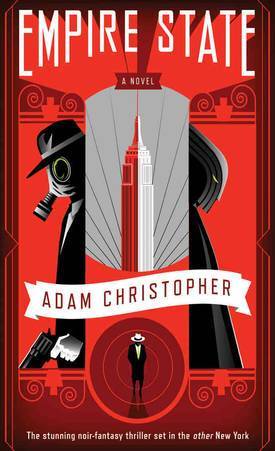
Adam Christopher's debut novel Empire State is a noir, Philip K Dick-ish science fiction superhero story about a pocket universe that's created when two battling New York superheroes open a vent through spacetime. New York City is reflected through this vent into the pocket, and in the distorted surface of the pinched-off bubble of reality, the city is reflected back in strange, existential form. The new city is called Empire State, and it is a grey, washed-out version of New York, perpetually shrouded in mist, perpetually at war, and the brave lads of Empire State are forever being wired into the bodies of robots and sent off in seagoing Ironclads, warships that never return.
New York and Empire State are imperfect mirrors of one another, and only a handful of people in either city know or suspect of the existence of the other. Some people are mirrored in the new world, versions of themselves that are either convincingly like the original, or their polar opposite, or something in between. The year is 19, nineteen years after the creation of Empire State, and the war slogs on, and the strange, violent bureaucracy that runs the city and persecutes the war tightens up the rationing and prohibition that make life even darker in Empire State.
This is a novel of surreal resonances, things that are like other things, plot turns that hearken to other plot turns. It's often fascinating, as captivating as a kaleidoscope, especially if you don't spend too much time trying to figure out the mechanics of the setup, the physics of the worlds. Just let it wash over you, the way that Jonathan Lethem's phildickian debut Gun, With Occasional Music does, and don't think too hard -- just feel it in all its weird glory.
This is a promising debut, and the publisher, Angry Robot, is pursuing a great promotion: WorldBuilder, "our way of reaching out to the fan creator communities, to invite you to come play in our yard." It's an official, sanctioned place where fans and pros can work together to create new media inspired by Empire State and its superheroes, hard-boiled dicks, traitors, madmen, cult leaders, and endless war.
Empire State
https://boingboing.net/2011/12/27/empire-state-a-phildickian-noi.html
5 notes
·
View notes
Text
Neither Huxleyed, nor Orwelled: living in the Phildickian dystopia

Political scientist and sf fan Henry Farrell (previously) argues persuasively that the dystopian elements of our everyday life are best viewed through the lens of Philip K Dick (whose books repeatedly depicted a world of constructed realities, whose true nature was obscured by totalitarians, conspiracies, and broken computers) and not Orwell or Huxley, whose computers and systems worked altogether too well to be good parallels for today's janky dystopia.
In the PKDverse, it's increasingly hard to tell bots from humans (and even the bots might struggle to tell whether they are or are not artificial), and "centaurs" (human-machine collaborations) poison our mediasphere with software agents that periodically get puppeted by real-life trolls. These centaurs use captured bits of human intelligence -- Wikipedia scrapes, messages harvested from social media -- to impersonate humans when no human is available to puppet them, but then summon human assistance when they reach a crux that's above their paygrade -- a moment of truth when it is possible to effect an epic troll, or complete the next phase of a giant con.
https://boingboing.net/2018/01/17/ubiks-centaurs.html
645 notes
·
View notes
Text
#2yrsago Medusa's Web: Tim Powers is the Philip K Dick of our age
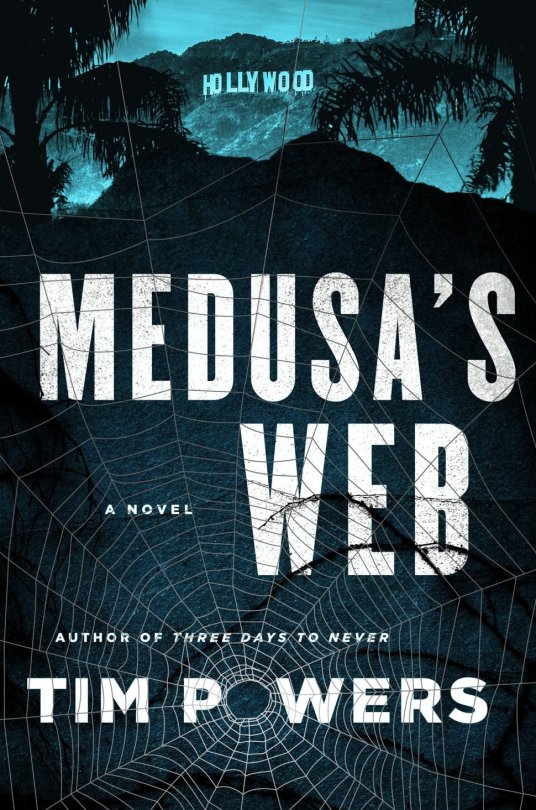
Tim Powers is a fantasy writer who spins out tales of wild, mystic conspiracy that are so believable and weird, we're lucky he didn't follow L Ron Hubbard's example and found a religion, or we'd all be worshipping in his cult. Along with James Blaylock and KW Jeter, Powers was one of three young, crazy genre writers who served as Philip K Dick's proteges, and Powers gives us a glimpse of where Dick may have ended up if he'd managed to beat his own worst self-destructive impulses.
Powers' latest (and, to my mind, best) novel is Medusa's Web, a meticulously researched novel about an extended, dysfunctional family whose secret history is bound up with "spiders" -- eight-legged drawings that allow you to travel out of your body and into other places and times, when other spiders were taken.
The spiders have been with us for centuries; Medusa's eight-snaked head was a spider, and the reality is that looking into her eyes didn't turn men to stone, it merely transfixed them as they imbibed the experiences of thousands of other people, including, possibly, people from other planes of experience. The spiders are alive, two-dimensional beings for whom all times are the same time, and when you notice them, they notice you and take you into their world, where all objects appear infinitely tall, where depth vanishes. Taking spiders means letting strangers through all history enter your body, or sometimes, future versions of yourself, and their use of your limbs and mouth can leave you injured, or even dead.
But the spider-users crave them, because there's that moment, that moment of dislocation when you're in no body and every body, when your self is blissfully obliterated. This is a story about drugs and addiction, in the phildickian style, but Powers far surpasses Dick.
Powers's story is set in Los Angeles, in the huge, decrepit mansion of the old lady who served as matriarch to the family -- a house that recalls the House of Usher in more ways than one -- a mansion that has played a key role in the history of spiders and Hollywood, involving a cast of characters that includes Rudy Valentino and many of silent film's most debauched leading lights. The Powers method for constructing secret histories is to line up seemingly unrelated historical events that share a place or time and then invent a connection to explain the coincidence, and it works brilliantly here, as the very geography of LA and the history of film are recruited to give a plausible footing to the story Powers tells.
The themes of Medusa's Web have been part of the Powers canon since the start; possession was a major theme of Dinner at Deviant's Palace, and it returns in his World Fantasy Award-winning masterpiece Last Call. The ancient conspiracies stretching back into Greco-Roman mythology will be familiar to those who enjoyed Hide Me Among the Graves as much as I did.
But Powers isn't rehashing his favorite themes, he's honing, making them sharp enough to slice away our reality in that Philip K Dick way. But Dick was a self-destructive drug addict whose speed ran ahead of his prose, producing brilliant but uneven books with stilted dialog and weird protrusions in the plot that remind you that you're reading a story, not a history. Powers went from being "a big fan of alcohol" to a teetotaler more than 20 years ago, and he's got both the intimate knowledge of being out-of-control and the sobriety to be in control when he writes about it. If Dick had gone sober and practiced his craft for 20 years longer, he could have written a book like this.
Reading any Powers novel is a visit to an alternate reality where everything, even the stones, are conspiring with one another. Medusa's Web is a gorgon of a novel, constructing that sinister, paranoid reality so perfectly that it transfixes anyone who dares crack its cover.
Medusa's Web [Tim Powers/William Morrow]
https://boingboing.net/2016/03/18/medusas-web-tim-powers-is-t.html
7 notes
·
View notes
Text
#7yrsago Empire State: a phildickian noir detective/superhero/pocket universe novel
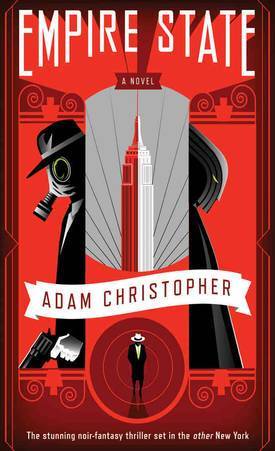
Adam Christopher's debut novel Empire State is a noir, Philip K Dick-ish science fiction superhero story about a pocket universe that's created when two battling New York superheroes open a vent through spacetime. New York City is reflected through this vent into the pocket, and in the distorted surface of the pinched-off bubble of reality, the city is reflected back in strange, existential form. The new city is called Empire State, and it is a grey, washed-out version of New York, perpetually shrouded in mist, perpetually at war, and the brave lads of Empire State are forever being wired into the bodies of robots and sent off in seagoing Ironclads, warships that never return.
New York and Empire State are imperfect mirrors of one another, and only a handful of people in either city know or suspect of the existence of the other. Some people are mirrored in the new world, versions of themselves that are either convincingly like the original, or their polar opposite, or something in between. The year is 19, nineteen years after the creation of Empire State, and the war slogs on, and the strange, violent bureaucracy that runs the city and persecutes the war tightens up the rationing and prohibition that make life even darker in Empire State.
This is a novel of surreal resonances, things that are like other things, plot turns that hearken to other plot turns. It's often fascinating, as captivating as a kaleidoscope, especially if you don't spend too much time trying to figure out the mechanics of the setup, the physics of the worlds. Just let it wash over you, the way that Jonathan Lethem's phildickian debut Gun, With Occasional Music does, and don't think too hard -- just feel it in all its weird glory.
This is a promising debut, and the publisher, Angry Robot, is pursuing a great promotion: WorldBuilder, "our way of reaching out to the fan creator communities, to invite you to come play in our yard." It's an official, sanctioned place where fans and pros can work together to create new media inspired by Empire State and its superheroes, hard-boiled dicks, traitors, madmen, cult leaders, and endless war.
Empire State
https://boingboing.net/2011/12/27/empire-state-a-phildickian-noi.html
21 notes
·
View notes
Text
Medusa's Web: Tim Powers is the Philip K Dick of our age #1yrago
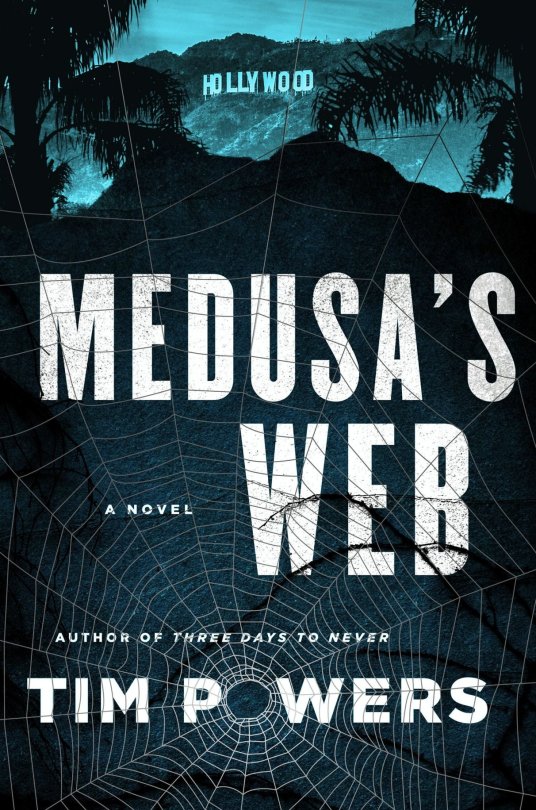
Tim Powers is a fantasy writer who spins out tales of wild, mystic conspiracy that are so believable and weird, we're lucky he didn't follow L Ron Hubbard's example and found a religion, or we'd all be worshipping in his cult. Along with James Blaylock and KW Jeter, Powers was one of three young, crazy genre writers who served as Philip K Dick's proteges, and Powers gives us a glimpse of where Dick may have ended up if he'd managed to beat his own worst self-destructive impulses.
Powers' latest (and, to my mind, best) novel is Medusa's Web, a meticulously researched novel about an extended, dysfunctional family whose secret history is bound up with "spiders" -- eight-legged drawings that allow you to travel out of your body and into other places and times, when other spiders were taken.
The spiders have been with us for centuries; Medusa's eight-snaked head was a spider, and the reality is that looking into her eyes didn't turn men to stone, it merely transfixed them as they imbibed the experiences of thousands of other people, including, possibly, people from other planes of experience. The spiders are alive, two-dimensional beings for whom all times are the same time, and when you notice them, they notice you and take you into their world, where all objects appear infinitely tall, where depth vanishes. Taking spiders means letting strangers through all history enter your body, or sometimes, future versions of yourself, and their use of your limbs and mouth can leave you injured, or even dead.
But the spider-users crave them, because there's that moment, that moment of dislocation when you're in no body and every body, when your self is blissfully obliterated. This is a story about drugs and addiction, in the phildickian style, but Powers far surpasses Dick.
Powers's story is set in Los Angeles, in the huge, decrepit mansion of the old lady who served as matriarch to the family -- a house that recalls the House of Usher in more ways than one -- a mansion that has played a key role in the history of spiders and Hollywood, involving a cast of characters that includes Rudy Valentino and many of silent film's most debauched leading lights. The Powers method for constructing secret histories is to line up seemingly unrelated historical events that share a place or time and then invent a connection to explain the coincidence, and it works brilliantly here, as the very geography of LA and the history of film are recruited to give a plausible footing to the story Powers tells.
The themes of Medusa's Web have been part of the Powers canon since the start; possession was a major theme of Dinner at Deviant's Palace, and it returns in his World Fantasy Award-winning masterpiece Last Call. The ancient conspiracies stretching back into Greco-Roman mythology will be familiar to those who enjoyed Hide Me Among the Graves as much as I did.
But Powers isn't rehashing his favorite themes, he's honing, making them sharp enough to slice away our reality in that Philip K Dick way. But Dick was a self-destructive drug addict whose speed ran ahead of his prose, producing brilliant but uneven books with stilted dialog and weird protrusions in the plot that remind you that you're reading a story, not a history. Powers went from being "a big fan of alcohol" to a teetotaler more than 20 years ago, and he's got both the intimate knowledge of being out-of-control and the sobriety to be in control when he writes about it. If Dick had gone sober and practiced his craft for 20 years longer, he could have written a book like this.
Reading any Powers novel is a visit to an alternate reality where everything, even the stones, are conspiring with one another. Medusa's Web is a gorgon of a novel, constructing that sinister, paranoid reality so perfectly that it transfixes anyone who dares crack its cover.
Medusa's Web [Tim Powers/William Morrow]
https://boingboing.net/2016/03/18/medusas-web-tim-powers-is-t.html
10 notes
·
View notes